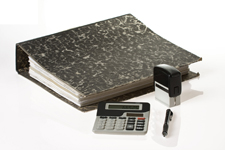Contents
Last updated: May. 15, 2013
 In part two of a two-part series, we offer tips on how to get started with your company’s bookkeeping. Previously, in part one, we outlined reasons why bookkeeping is important for your business.
In part two of a two-part series, we offer tips on how to get started with your company’s bookkeeping. Previously, in part one, we outlined reasons why bookkeeping is important for your business.
So, let’s get going. What do you need to know to get up and running with your company bookkeeping?
What Records does the CRA Require?
The CRA (Canada Revenue Agency) requires that you keep records for your income tax, payroll, and GST/HST remittance. It’s advisable that you go beyond these minimum requirements. Your files and records should also include:
- Employee records
- Equipment and supply inventory
- Licenses/certifications
- Long-term documents that impact your business such as property documents and estate records
What Other Documents do I Need to Keep?
CRA expects you to keep pretty much every piece of paper or correspondence that relates to your filings.
Your business records should include:
- Ledgers
- Journals
- Vouchers
- Financial statements and accounts
- Tax records.
The list of support documentation is a long one and includes sales invoices, purchase receipts, contracts, guarantees, and much more.
Why are Support Documents Important?
It is important to keep your original documents.
CRA will not accept credit card statements. You’ll need to produce original receipts to support the expenses. If cash is deposited into your account and there is no record, CRA will likely assume it is income when it might just be a transfer or loan.
If cash is withdrawn, CRA may assume it was a personal draw without records to show what expenses it covered.
How Long do I Need to Keep Documents?
As a general rule, all records and supporting documents must be kept for 6 years and can either be in paper or electronic form.
You are allowed to convert paper files to electronic format but electronic forms cannot be destroyed even if you’ve printed them.
What Should I Use to Manage my Records?
There are a variety of ways to manage your bookkeeping from old-fashioned pencil and paper ledger to spreadsheet software to dedicated bookkeeping or accounting software.
You can also hand it over to a company that specializes in record keeping. Some even come to your home or place of business to take care of your books.
What is the Best Way to Establish a Routine?
Whether you decide to “outsource” your bookkeeping or go it alone, it’s important to establish a routine for regularly filing your receipts and recording the expenses and income. With outsourcing, you simply hand over your paperwork to accounting and tax experts and they take care of the rest. This frees up your time so you can get back to running your business.
If you decide to do it yourself, accounting software can help you record your expenses and income correctly. Some apps allow photos of receipts from your mobile device to be attached to the appropriate transaction. You don’t even have to wait until you get back to your office to take care of your bookkeeping.
Dealing with your expenses and income as they happen means you’re less likely to forget.
What if I am Already Behind in my Bookkeeping?
Let’s you say you started your business in January and haven’t kept any records yet. Don’t panic and don’t try to catch up all at once. Instead, start with the current month and the first month (January). Next month, do that month and February. In short order, you’ll be all caught up. The important thing is to get started today.
